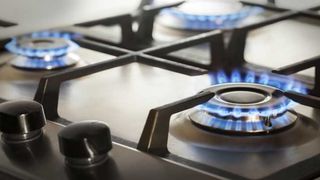Both gas and electric models will come in a range of sizes and many have similar looks too, so when it comes to weighing up the plus and minus points for each, it really comes down to performance, maintenance, and for many, cost. Electric ovens will normally be cheaper to buy initially than a gas model and many benefit from clever features that can even act as one of the best air fryers (opens in new tab), but with extra features, you can, of course, expect a higher price tag. The gas vs electric oven debate may also depend on what you use your oven for the most. Hear us out, we know you’ll be using it for cooking but here we’ll be discussing whether gas or electric ranges are preferred by professional chefs and why.
Gas vs Electric ranges: Lighting the oven
Electric ovens are super easy to switch on. Most have a dial that you simply twist to find the temperature you want, and an additional dial to select the cooking function. Some alternatives have buttons instead. However, if there’s a power outage, you won’t be able to use your oven at all. Gas ovens, however, require an igniter which can sometimes be electric-powered, but if there’s a power outage you can light your oven manually (although, we recommend being extremely careful doing this). Gas ovens often require you to press an ignition button while you choose which oven heat setting you’d like.
Gas vs Electric ranges: Even heating
When it comes to warming up, electric ovens can be a bit slower but once they’re hot, they provide great even heat across the whole oven. Gas ovens might warm up fast but because they work by using a flame, there isn’t consistent heat in the oven. Gas ovens will be hottest at the top due to the heat rising but you can also use the bottom of the oven to create a crisp finish to your dishes. This doesn’t mean, however, all food will be unevenly cooked in a gas oven. Instead, you’ll need to make more of an effort to rotate your roasting trays and move food up and down in the oven so that everything is cooked at the same time. Electric ovens, especially those with convection technology, will provide a more even heat across the whole oven. Convection works by circulating the heated air around the oven so that all sides of your food is evenly cooked. This feature is also great for creating crispy potatoes. Electric ovens are also our winner when it comes to baking cakes. That’s because the heat is more even and you won’t end up with one side of your cake cooked more than the other.
Gas vs Electric ranges: Adjusting the heat
Gas ovens are normally preferred by professional chefs and that’s due to their instant heat adjustability. In the oven itself, you’ll be able to turn the flame down quickly, however, the cooktop is where it’s really handy. While the best electric cooktops (opens in new tab) heat up fast, it takes much longer for the temperature to come back down if you want to lower the heat. This means it’s easy to burn sauces or prevent them from sticking to the bottom of the pan. If you’re considering an alternative, check out our feature on what is an induction cooktop, and should you buy one? (opens in new tab)
Gas vs Electric ranges: Ease of cleaning
When it comes to cleaning your oven, many modern versions are now available with steam cleaning functions. These normally require very little effort to remove burnt-on dirt and food build-up. When it comes to the cooktops, though, electric models have the benefit of a smooth surface that you can simply wipe over (although, some do require specialist cleaning solutions). Gas versions require you to take off the grates and give those a clean too, which can be time-consuming and you can accidentally knock the heating parts. For handy tips on keeping your range clean, read our advice on how to clean an oven in five easy steps (opens in new tab).
